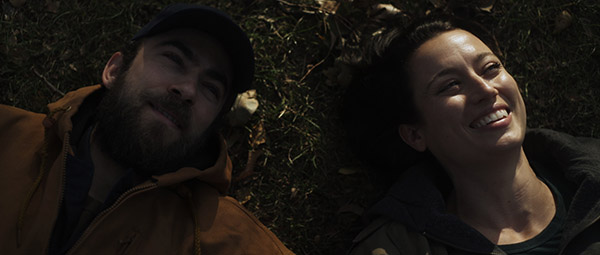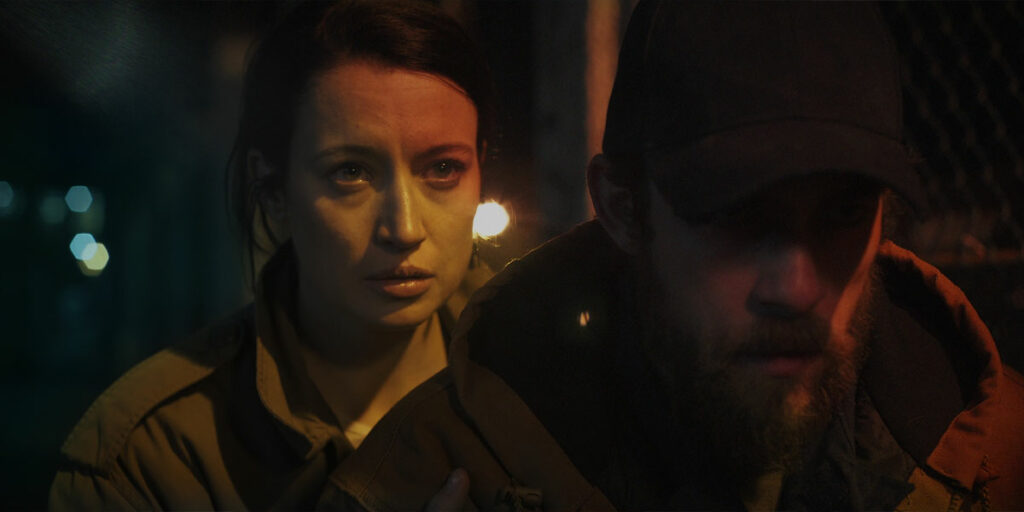When I Consume You may deal with interesting concepts on paper, like addiction, loss, and guilt, but its presentation has plenty of faults.
The title of Perry Blackshear’s latest feature, When I Consume You, can be interpreted in many ways; however, it can mostly be attributed to one’s inner demons. It could be an addiction to a sort of substance, self-destructive behavior, or depression. These demons consume a person whole from the inside out. They are hard to escape once the effects of each have taken their toll, but they aren’t ineliminable. It depends on the steps you take to change. When I Consume You revolves around the accountability for the death of a loved one and a mysterious force from the beyond – a spirit that has risen from the dead to help you cope. Despair and depravity fill the screen from the immediate first seconds of the movie. The film begins with a scene where a woman named Daphne (Libby Ewing) takes off one of her teeth. There’s no specific reason for her to do such a thing, but it seems as if something is eating her alive on the inside.
In the next scene, we learn that she has been dealing with addiction for her entire life, but something else is causing this painful sensation. Does she have something to hide? Daphne doesn’t want to tell her brother, Wilson (Evan Dumouchel), what’s happening to her. Their brother-sister relationship is tight, depicted early on with lovely and empathetic scenes of Daphne calming Wilson down after he had a panic attack, yet she’s keeping some secrets to her own. The two of them are not having the best of times, as their job search is not looking good, and they need to make ends meet. One day, however, Wilson finds his sister’s dead body and learns that a mysterious cloaked figure murdered her. He’s absolutely torn – broken by the loss of the person he loved the most and was closest to. Daphne was the person he could always count on when he felt stressed, depressed, or anxious. This loss changes Wilson’s attitude toward life for the worse.
Nonetheless, after some time has passed, Daphne somehow manages to get back to the realm of the living, even though only Wilson can see and speak to her. Naturally, Wilson wants to find out the truth about her death and avenge her, but that might be harder than he thinks, as the mystery men are hard to track and dangerous. So, with the help of Daphne’s spirit (if it could be called as such), the brother-sister duo embarks on a revenge journey.

Blackshear’s directing style is primarily straightforward and doesn’t carry a considerable amount of flashy techniques or style, which is for the better. He’s a DIY director – doing the entire project’s directing, writing, editing, and cinematography. And in some occasions, it feels as such. There’s this sensation that he’s the only person pulling the cinematic strings; it is his vision and nobody is going to stop him from achieving it. Because there isn’t another editor telling to cut some of the sequences short, some scenes lounge on for far too long, and others are roughly edited, particularly the quick montage sequences. In those sequences, it feels as if he wanted to rush the story by doing some quick shots of essential details – important objects and photographs that are meant to showcase their current life and situations. This creates pacing issues throughout the movie.
It is sometimes hard to keep track of what’s happening in the film because of the shoddy and quick editing, as well as the poor use of shaky camera maneuvers. And when it begins to mess with time, going back and forth from the present day to the past, it gets harder to figure out the narrative. Blackshear is in control of his abilities when he’s doing claustrophobic horror elements (the initial scenes of the ripping of the tooth) and the lovely brotherly bonding scenes. Unfortunately, the rest of the film is inadequately orchestrated. The most exciting aspect of the cinematography is that it captures the grittiness of the city quite well, which contrasts with their situation before and after the death of Daphne. In some ways, it reminds me of Trey Edward Shults’ It Comes at Night, with its metaphors about trauma and dealing with the death of a close one, but the execution causes the final product to feel less than what it is aiming for.
When I Consume You begins as a straightforward revenge thriller with ghostly apparitions representing the stages of grief and addiction (denial, paranoia, depression, acceptance) and ends up developing as a genre exercise with horrific thrills, which leaves more to be desired from its first two acts. The film attempts to misdirect the audience during its middle segments but spends too much time trying to deceive instead of creating a more profound sense of dread and trepidation. It isn’t terrible, but it feels as if it keeps losing itself further and further as it keeps meandering – tiptoeing through the same beats for an extended period. There’s potential for a better feature here; I won’t deny it. However, its metaphors sound far more interesting on paper rather than in execution. I would like to see what Perry Blackshear has to offer in his next venture into the horror genre, as there’s a possibility of him fixing some of the errors that cursed this film, but for the time being, I am left feeling disappointed with When I Consume You.
WATCH WHEN I CONSUME YOU:
When I Consume You is now available to watch on digital platforms. Watch When I Consume You!

